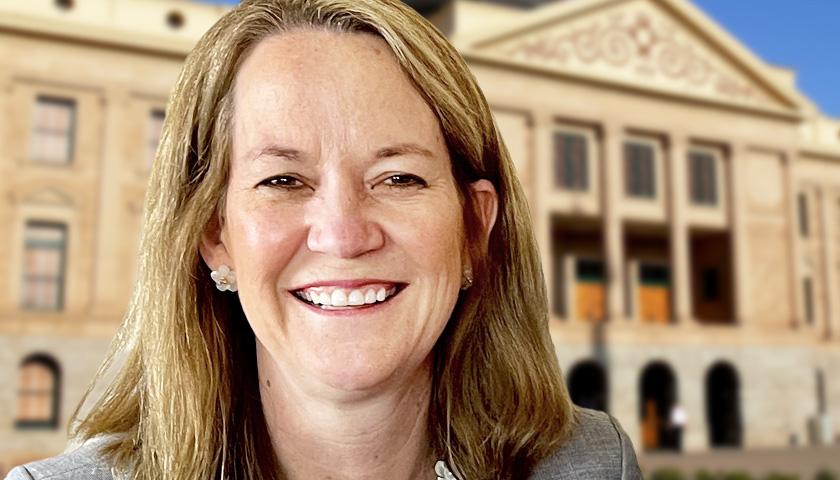A bar complaint was filed against Democratic Attorney General Kris Mayes by Chandler resident Charlie Schinke, a precinct committeeman who ran unsuccessfully for Maricopa County Republican Committee treasurer earlier this year. In his complaint, Schinke alleges Mayes (pictured above) of violating her ethical duties to two state clients by threatening one with a potential criminal investigation and publicly admonishing another client in a press release, and asks the State Bar of Arizona to investigate whether the state attorney general violated Arizona Rules of Professional Conduct 1.6 and 1.7.
The complaint notes, “In just the last month, Ms. Mayes appeared on television to threaten one of her clients with an investigation that could carry potential criminal dimensions, and publicly admonished another client in letters that she distributed in a press release.”
It adds, “The Attorney General’s self-appointed status as the investigator of her own clients not only is inconsistent with her statutory responsibilities but compromises the ethical obligations that bind all members of the Arizona Bar.”
The complaint explains, “Attorney General Mayes’ public criticisms of, and threats to investigate, her own clients are inconsistent with her duties of confidentiality and loyalty.”
ARPC 1.6(a), Confidentiality of Information, provides in part, “A lawyer shall not reveal information relating to the representation of a client unless the client gives informed consent, the disclosure is impliedly authorized in order to carry out the representation or the disclosure is permitted or required by” certain sections within the rules.” Schinke noted that comment 6 after the rule, which cites case law, states, “The requirement of maintaining confidentiality of information relating to representation applies to government lawyers who may disagree with the policy goals that their representation is designed to advance.”
ARPC 1.7, Conflict of Interest, provides that a lawyer shall not represent a client if the representation “will be materially limited” by “a personal interest of the lawyer.
The complaint letter reviews Mayes’ actions directed at her client, the Arizona Department of Water Resources (ADWR). Citing a letter Mayes sent to ADWR, it states, “After advising Director Buschatzke of ADWR’s statutory duties, Attorney General Mayes launched into an extended critique of the agency’s studies of so-called active management areas and demanded that Director Buschatzke supply her with documentation evidencing the agency’s compliance with its responsibilities.”
The complaint alleges that publicly discussing this dispute with her client violates ARPC 1.6. He also accused her of violating A.R.S. 41-192(A)(1)), which addresses attorney-client relations between the attorney general and state agencies. It states that the attorney general shall “[b]e the legal advisor of the departments of this state and render such legal services as the departments require.”
The document points to Mayes’ statement during an interview on KPNX’s Sunday Square Off in response to whether ADWR is answerable to the governor, not the attorney general.
“If the Department of Water Resources was following the law, I would say yes, but I don’t believe that the Department of Water Resources for several decades now, especially the last decade, has been following the law,” she said, hinting at an investigation.
The second allegation was of Mayes’ statements during the interview suggesting she would investigate her client, the Arizona Department of Education (ADOE). Mayes is “a vociferous opponent of parental choice in education,” it states, and that the attorney general’s office “is going to be looking at fraud, waste and abuse in the universal school voucher program.”
The complaint quotes Mayes, “We’re going to take a hard look at this program.”
The document explains that Mayes “suggested there was already ‘evidence’ of putative wrongdoing, complaining that ‘there are no controls on this program, there’s no accountability and they are spending hundreds of millions of dollars of taxpayer money and that needs to be looked at.’”
Mayes ended that interview saying she had made a “commitment to investigate.”
The letter outlines how Mayes allegedly violated ARPC 1.7. Instead of investigating an individual or individuals, she “is investigating the agency itself concerning its administration of the school choice program as a whole, with the thinly veiled purpose of undermining a policy achievement that offends her ideological preferences,” it states. “Attorney General Mayes’ subordination of her client’s interests to her own political objectives is a textbook conflict of interest under ER 1.7(a).”
A week before Schinke’s bar complaint letter, the leadership of both houses of the Arizona Legislature sent Mayes a scathing letter demanding that she redact public comments she made against Arizona’s ESA program. The lawmakers stated, “Your job, as an executive branch official, is to execute the law, not attack it.”
– – –
Rachel Alexander is a reporter at The Arizona Sun Times and The Star News Network. Follow Rachel on Twitter. Email tips to [email protected].
Photo “Kris Mayes” by Arizona Attorney General Kris Mayes. Background Photo “Arizona Capitol” by Wars. CC BY-SA 3.0.





